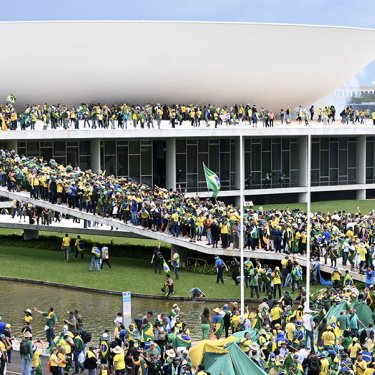Reporters attacked during assault on Brazilian democracy by Bolsonaro supporters

After at least 11 reporters were harassed while covering the storming of the supreme court, congress and presidential palace in Brasilia on 8 January, Reporters Without Borders (RSF) condemns anti-media violence by supporters of far-right former President Jair Bolsonaro and calls on the authorities to respond firmly by punishing those responsible and ending the mounting attacks on journalists that pose an additional threat to Brazilian democracy
Many journalists reported undergoing terrifying experiences during the 8 January mayhem in Brasilia. After being identified as media personnel by Bolsonaro supporters, they said they were surrounded, harassed and threatened, and that in some cases they were physically attacked and their equipment was stolen.
Bolsonaro supporters robbed equipment from Agence France-Presse and Reuters photographers near the Planalto presidential palace. Ten men surrounded a photographer working for the Metrópoles website, hit him inthe stomach and took his equipment. A reporter for the newspaper O Tempo was threatened at gunpoint inside the National Congress. Washington Post reporter Marina Dias was harassed, jostled and physically attacked as she tried to protect her phone. Other reporters were also threatened and had their equipment stolen and destroyed.
These extremely serious attacks on journalists trying to cover an unprecedented assault on Brazilian democracy are unacceptable. Filmed scenes show that authoritarianism and coup attempts go hand in hand with violence against the media and censorship. The climate of hatred towards journalism fuelled by former President Jair Bolsonaro’s government in recent months exacerbated the putschist hostility towards the media, which were seen as an enemy to be eliminated. As a matter of urgency, the authorities must end this dangerous escalation, which poses an additional threat to Brazilian democracy, and they must do their utmost to punish the perpetrators of this violence.
At least seven cases of aggression against the media had already been reported in the first week of 2023 – most of them in connection with coverage of the camps set up by Bolsonaro supporters outside military barracks in various cities.
According to a survey by the National Federation of Journalists (FENAJ) and the Brazilian Association of Investigative Journalism (ABRAJI), reporters covering the activities of Bolsonaro supporters since the second round of the presidential election on 30 October have been subjected to 70 acts of aggression near or in connections with their camps. Registered in a total of 19 Brazilian states and the federal district, they included threats, harassment, physical assaults, destruction of equipment and even shots fired at a media outlet and an arson attack on a radio station.
In the course of monitoring Brazil’s social media from mid-August (the start of the election campaign) until mid-November (two weeks after the second round runoff), RSF registered more than 3 million messages subjecting journalists to insults or verbal violence. What took place in Brasilia on 8 January showed that the climate of hostility towards journalists prevailing online can spill over into serious acts of physical violence against the media
